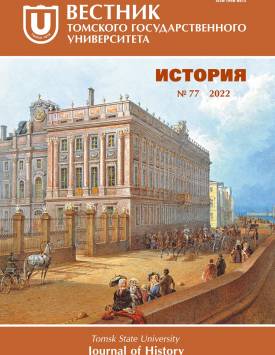Modern Russian historiography on the relevance of the pedagogical heritage of Slavophiles
Employing the methodological toolkit of the civilizational approach, the purpose of the study is to identify those aspects of the Slavophil pedagogical concept that correspond to the current demands and needs of contemporary society, and therefore are actively developed by the scientific community. The historiography of the Slavophil pedagogical concept, which is the research object, is chronologically limited by the framework from the beginning of the 21st century to the present days. In particular, the authors analyze the works by L. N. Belenchuk, L. A. Gritsay, I. V. Karlov, P. I. Kasatkin, V. N. Katasonov, A. A. Korolkov, V. A. Kravtsov, V. V. Kulikov, S. V. Kulikova, A. S. Kurenkov, O. V. Parilov, S. I. Skorokhodova, B. N. Tarasov, and others. Based on the analysis of the scientific contribution of each researcher to the development of the topic, the paper shows which philosophical and pedagogical ideas of the Slavophiles are relevant and might be in demand in the process of reforming the education system in Russia. The paper examines the value priorities of the Slavophiles in pedagogy, and also compares them with the trends that are in force today in the Russian education system. In particular, the principle of humanization, which is officially proclaimed as one of the main requirements for educational activities, is highlighted and covered in the paper. However, according to many researchers, this principle is often declarative and therefore only to a small extent implemented both in state standards and other normative documents regulating the activities of educational institutions, as well as in educational practice. The Slavophiles, on the other hand, were consistent supporters of the humanization both in education and the social sphere as a whole. They considered the moral improvement of humans to be the main criterion of social progress. The emphasis in the paper is on the need to combine the scientific and axiological components in the content of education, with the determining role of national values. The Slavophiles considered education and upbringing to be important tools for the formation of an internally integral personality and prevention of social conflicts. They assigned a special role to teaching history, since it is historical education that contributes to the preservation of the continuity of generations, forming civic consciousness and the cultural identity of the people. The authors conclude that historiography of the last decades emphasizes that the pedagogical potential of the historical and philosophical educational concept of Slavophilism today may well be used, since it still contains highly relevant idea of the synthesis of the national and universal, innovative and traditional, individual and social in the educational process. Therefore, as many researchers believe, an appeal to the pedagogical heritage of Russian Slavophile thinkers can be quite productive for choosing methods for resolving the contradictions of modern society in the context of reproducing the domestic civilizational model of public education and enlightenment. The authors declare no conflicts of interests.
Keywords
Slavophilism, historiography, Russian pedagogy, education, national identityAuthors
| Name | Organization | |
| Shirokova Marina A. | Altay State University | mshirokova1@rambler.ru |
| Dolzhikov Vyacheslav A. | Altay State University | dolshikov@yandex.ru |
References

Modern Russian historiography on the relevance of the pedagogical heritage of Slavophiles | Tomsk State University Journal of History. 2022. № 77. DOI: 10.17223/19988613/77/17
